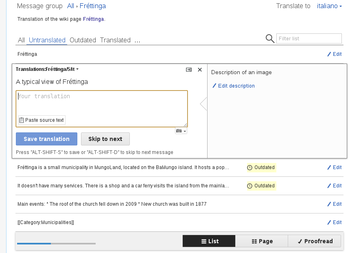translatewiki.net, formerly named Betawiki, is a web-based translation platform[1] powered by the Translate extension for MediaWiki. It can be used to translate various kinds of texts but is commonly used for creating localisations for software interfaces.
 | |
| Original author(s) | Niklas Laxström |
|---|---|
| Developer(s) | Niklas Laxström, Siebrand Mazeland |
| Initial release | July 2006 (alpha: 2005) |
| Stable release | Continuous development / Monthly MLEB release |
| Engine |
|
| Operating system | Cross-platform |
| Available in | 300 languages |
| Type | Computer-assisted translation |
| License | GPL; free service |
| Website | translatewiki.net; documentation |
It has about 16,000 translators and over 120,000 messages to translate from over 50 projects including MediaWiki, OpenStreetMap, Mifos, Encyclopedia of Life and MantisBT.[2]
Features

Translatewiki.net is a wiki and so has a relatively low barrier to entry.[3]
Translations are synchronised between a version control system and translatable wiki pages.[4]
For MediaWiki on Wikimedia Foundation projects, new localisations may reach live sites within a day.
The translation editor provides various features for machine-assisted translation, such as
- message documentation, also known as "context",
- suggestions from a text corpus and machine translation,
- checking translations for common syntax mistakes,
- translation status of messages.[5][unreliable source?]
Translatewiki.net is also a Semantic MediaWiki, part of the semantic web.[6][7]
History
Translatewiki.net was made available by Niklas Laxström[8][unreliable source?] as localisation platform for all languages of MediaWiki around June 2006.[9][non-primary source needed]
Besides translation, it was developed with the characteristics of an integrated development environment for MediaWiki (Nukawiki in 2005[3]), with a focus on improvement of internationalisation features.[10]
At the end of 2007 Siebrand Mazeland joined the management of the website, which was moved to the current domain translatewiki
In April 2008, it already supported over 100 languages for MediaWiki and 200 of its extensions, "making it one of the most translated software projects ever", as well as FreeCol. Since then, while being an independent volunteer project,[11][12] it has been recognised as a major player in the global success of MediaWiki and the Wikimedia projects powered by it, like Wikipedia, in over 280 languages.[13][unreliable source?]
In 2009 it was improved by a Google Summer of Code project by Niklas Laxström.[14][non-primary source needed]In 2011 proofreading features were introduced.[15][non-primary source needed]In 2012, its translation memory engine expanded to all Wikimedia projects using Translate.[16][non-primary source needed]
In 2013, the Translate platform underwent a major revamp through the "Translate User eXperience" project, or "TUX", including "changes in navigation, editor look and feel, translation area, filters, search, and color & style".[5]
Supported formats
Some of the natively supported formats follow. More can be added with some customisation.[17][non-primary source needed]
- MediaWiki interface and pages
- GNU Gettext
- Java properties
- Android string resources
- INI
- Dtd
- PHP files
- JavaScript
- JSON
- PythonSingle
- YAML
- XLIFF (partial, in beta)
- AMD i18n bundle
Notable uses
- MediaWiki and MediaWiki extensions
- FreeCol
- OpenStreetMap
- Encyclopedia of Life
- MantisBT
- FUDforum
- Wikipedia mobile apps
- pywikibot
- Etherpad
- Kiwix
- Gentoo Linux documentation[18][19]
- KDE documentation[20][21]
- Kiwix website
- Joomla documentation[22]
- Pandora documentation
- Simple Machines Forum documentation[23]
References
External links
- Official website

- MediaWiki Translate extension page and documentation
- MediaWiki translatewiki.net
- Translatewiki.net at Open Hub


